Always tip the bellman.
The prevailing narrative (one I’ve peddled often) is that our great national division is a function of tribal politics, exacerbated by a media complex that uses sensationalism and catastrophism to entrench people further in their beliefs, while vilifying those who believe otherwise. It’s true. I’m just not sure if it’s the chicken or the egg.
For 10+ years, I’ve stayed religiously at the same independent, modest hotel in New York’s Garment District. I dig the familiarity – and being familiar – over more modern or opulent spots. I’m on bro-hugging terms with the bellman, Anthony, who’s worked there forever. Every morning, I grab him an espresso when I hit the Starbucks across the street.
Cumulatively, we’ve talked for hours over those coffees, usually while I’m waiting for my Uber. We mostly riff on sports, but I always ask him, “How’s the city doing?” Lately, he’s salty as hell about it. He’s having trouble making ends meet. Tips have plummeted, partly because nobody carries cash, yet he’s expected to tip for fast food he ordered at a kiosk. All of Manhattan’s being overrun by weed shops. He doesn’t feel safe taking the subway anymore. Everything was better before COVID. You can guess who he’s voting for in November.
It’s not unlike conversations I have with our cabin neighbors in deep red (hat) Appalachia, although their grievances are more generational. Decades of economic and government neglect gutted the town and its main street. The local school shuttered. Kids bus 40 minutes each way to the nearest K-12. Meanwhile, people elsewhere who look different – physically, culturally, or educationally – appear to have prospered. It must, therefore, be “those people’s” fault, a conclusion that political opportunists are far too eager to sow.
Even the best of us can confuse correlation for causation.
To be sure, many on the other side of the spectrum have no shortage of legitimate grievances, some persisting for centuries or even millennia. You could easily argue that those wrongs are more heinous, the need to right them is a greater moral imperative.
It doesn’t mean others aren’t hurting too. We preach empathy here all the time, easy for me to say as I write to an audience of largely white-collar, presumably fortunate readers. Asking a group who feels marginalized, however, to empathize with another who feels more marginalized is harder. Instead, they align with the politicos and talking heads who show (or feign) the greatest level of empathy for their particular plight.
To entirely blame politicians and the media for how everyone feels is to discredit their feelings altogether. Most people who are struggling don’t have the time or opportunity to study economics, to scour the internet for different points of view, or to ponder existential threats to democracy.
They just want to feel safe, to be seen, to be dignified.
They want their tips.
Here’s what we’re seeing:
Americans felt better about their financial health in March, but the underlying numbers are uneven. After falling for two months through mid-February, our Consumer Financial Health Index has been slowly improving. Investment and savings outlook have buoyed the index, enough to overcome more dour views about personal debt and credit. Feelings about household income were a hair below flat, representing the third straight month of red numbers for that component. It’s a mixed bag. I don’t know what else to say.
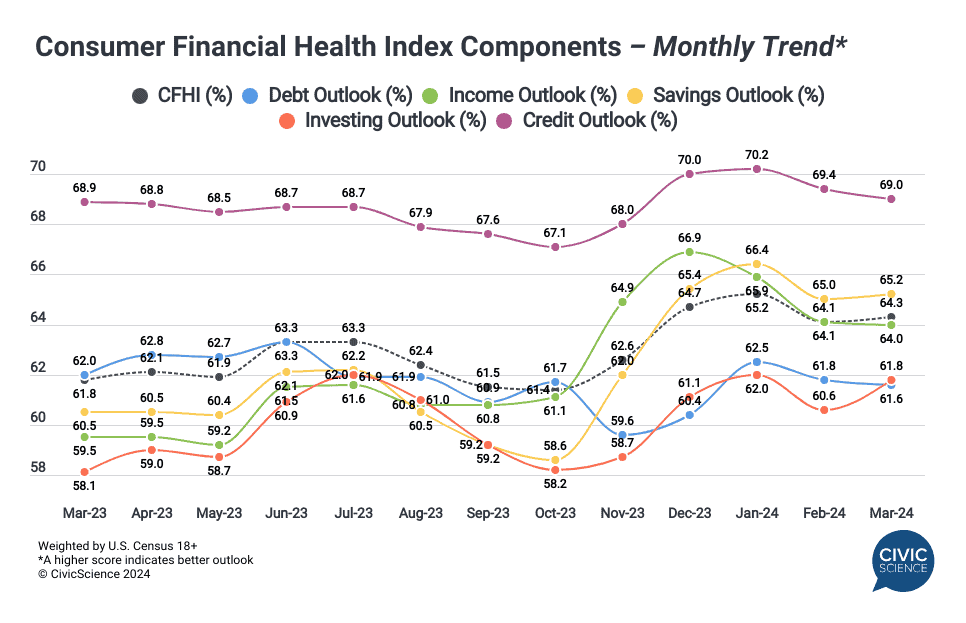
People are still tuning out politics. According to our latest Election Mindset Tracker, even the daily buzz of Trump trial news and manufactured outrage about Transgender Visibility Day hasn’t been enough to capture the attention of most Americans. In fact, Q1 was the first time since June of 2015 that more Americans say they’re not following politics at all, compared to those who follow it “very closely.” Just 30% of adults and 36% of Facebook users are posting about politics on social media. The trend does vary by platform, however, with over half of Reddit, Twitter, and Snapchat users saying they rant about politics. Also interesting, people are less likely to follow people they disagree with, except for our ever-enlightened Gen Zs.
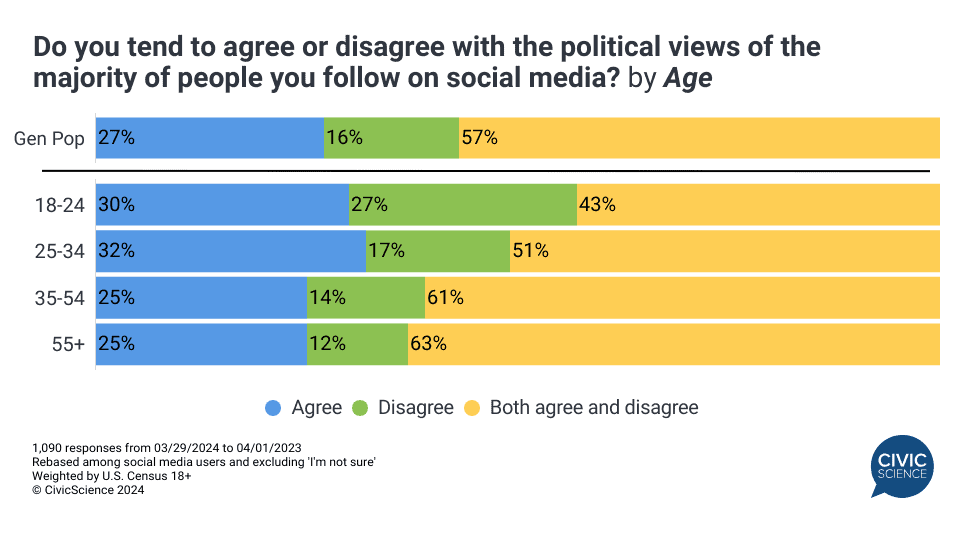
Airplanes falling apart and bridges collapsing don’t seem to be shaking people’s confidence in travel. In our 3 Things to Know this week, we look at Americans’ sense of safety when it comes to different means of transportation. Cars and trains yield the highest confidence, but air travel isn’t far behind. Notably, the results vary by income – with the lowest brackets feeling less safe across all travel modes. We also found that intermittent fasting ranks as the most common diet trend among many others and that young consumers are rapidly changing their in-store shopping habits because of retail theft.
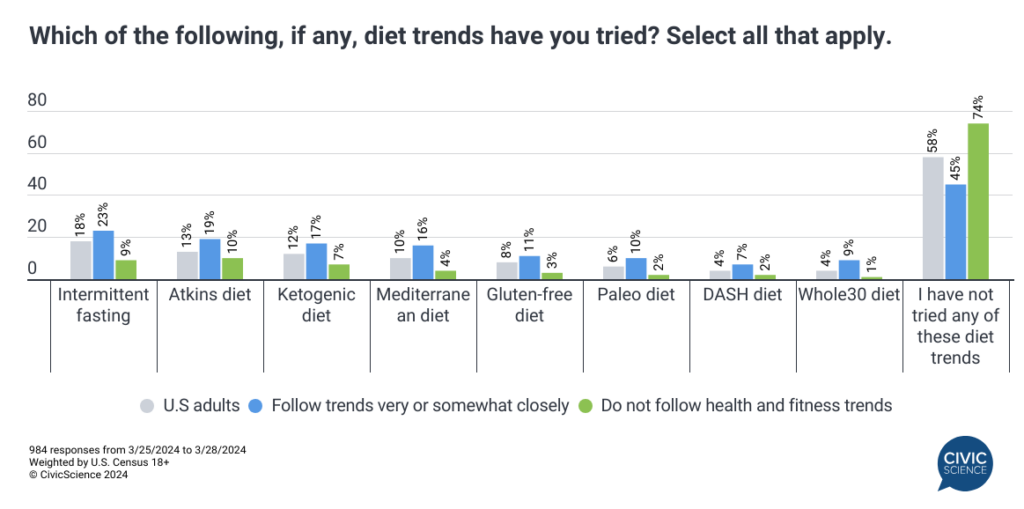
Way more Americans are planning home renovation projects this year, while leaning heavily on DIY. I suppose when people aren’t buying new homes, things eventually get long in the tooth. Thus, the percentage of homeowners who are gearing up for a remodeling or renovation job this year is up 29%. Forty-three percent of planned renovators will do it themselves, up from 38% in 2023. Bathroom renovations top the list, followed by outdoor. Among those who are hiring contractors, they’re most likely to find them via friends or family.
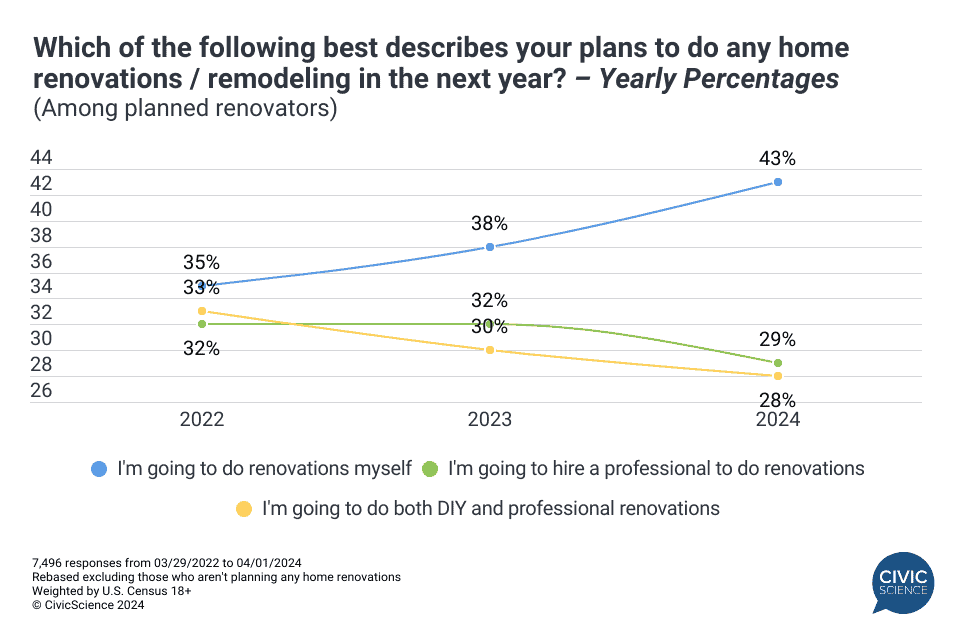
YouTube could benefit the most from a TikTok ban. I would be shocked if it ever happens – but if a hypothetical shutdown of TikTok were to materialize, current content creators would be most likely to move their wares to YouTube. I was surprised to see that Facebook ranked second, but it makes sense when you realize how much traffic it has. Also in this study, we found that over 1 in 5 TikTok users have sold something on TikTok Shop in the past six months, which is crazy.
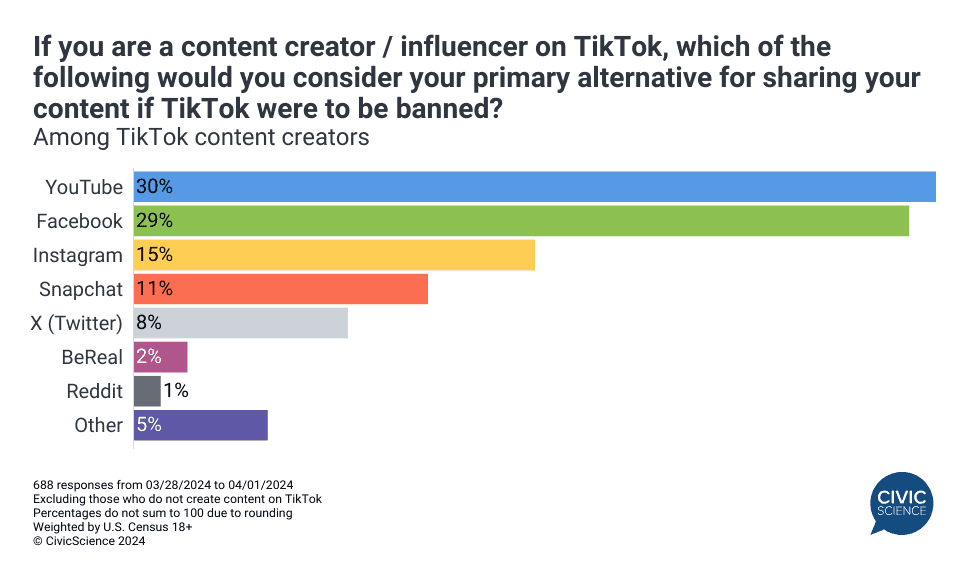
More awesomeness from the InsightStore™ :
- People are feeling the pinch of rising home insurance costs, further deterring new home buyers;
- Chick-fil-A could lose customers by using antibiotics in their chicken, but not many;
- Young men are driving an uptick in second-hand luxury retail;
- Five unexpected insights about people (assholes) who pull April Fools’ pranks.
The most popular questions this week:
How many social media accounts do you have?
Do you consider pets to be a member of your family?
Should cruise ships wait for late passengers?
Prefer homemade or store-bought dressing?
Are you traveling for the eclipse?
Answer Key: 4 if you count LinkedIn; Stupid question, absolutely; Within reason, I guess; Homemade; No, but I cancelled a meeting to watch it at home.
Hoping you’re well.
JD
Not on the list to receive this email? Sign up here. If you are new to this list, check out our Top Ten to get caught up.








